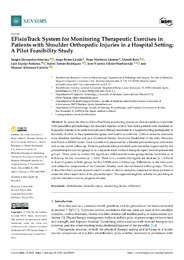Por favor, use este identificador para citar o enlazar este ítem:
https://hdl.handle.net/11000/38187
EFisioTrack System for Monitoring Therapeutic Exercises in Patients with Shoulder Orthopedic Injuries in a Hospital Setting: A Pilot Feasibility Study
Título :
EFisioTrack System for Monitoring Therapeutic Exercises in Patients with Shoulder Orthopedic Injuries in a Hospital Setting: A Pilot Feasibility Study |
Autor :
Hernández-Sánchez, Sergio
Roses-Conde, Jorge
Martínez-Llorens, Neus
Ruiz, Daniel
Espejo-Antunez, Luis
Tomás-Rodriguez, Isabel
Toledo-Marhuenda, José Vicente 
Albornoz-Cabello, Manuel |
Editor :
MDPI |
Departamento:
Departamentos de la UMH::Patología y Cirugía |
Fecha de publicación:
2024-07 |
URI :
https://hdl.handle.net/11000/38187 |
Resumen :
To assess the effects of the eFisioTrack monitoring system on clinical variables in patients with prescribed physiotherapy for shoulder injuries, twenty-four adult patients with shoulder orthopaedic injuries who underwent physical therapy treatment in a hospital setting participated in the study (twelve in the experimental group and twelve as controls). Clinical outcome measures were shoulder function and pain (Constant-Murley Score and Disabilities of the Arm, Shoulder, and Hand or DASH score). Each variable was measured by a blinded physiotherapist at baseline and at one month follow-up. Patients performed the prescribed exercises either supervised by the physiotherapist (control group) or in a separate room without therapist supervision (experimental group). There were no statistically significant differences between groups before treatment or at follow-up for any outcomes (p ≥ 0.05). There was a statistically significant decrease (p ≤ 0.05) of at least 10 points in both groups for the DASH score at follow-up. Differences in the total score and subjective components of the Constant-Murley were also evidenced within groups. The use of the eFisioTrack system showed similar results in clinical measures compared to those performed under the direct supervision of the physiotherapist. This approach might be suitable for providing an effective shoulder exercise program at home.
|
Palabras clave/Materias:
adherence
monitoring device
rehabilitation
shoulder injury |
Tipo de documento :
info:eu-repo/semantics/article |
Derechos de acceso:
info:eu-repo/semantics/openAccess
Attribution-NonCommercial-NoDerivatives 4.0 Internacional |
DOI :
10.3390/s24154898 |
Publicado en:
Sensors (Basel) . 2024 Jul 28;24(15):4898 |
Aparece en las colecciones:
Artículos Patología y Cirugía
|
 La licencia se describe como: Atribución-NonComercial-NoDerivada 4.0 Internacional.
La licencia se describe como: Atribución-NonComercial-NoDerivada 4.0 Internacional.

 La licencia se describe como: Atribución-NonComercial-NoDerivada 4.0 Internacional.
La licencia se describe como: Atribución-NonComercial-NoDerivada 4.0 Internacional.
.png)